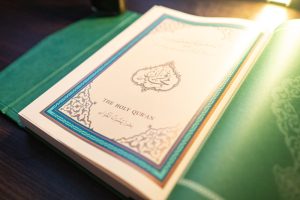Poverty is generally defined as a situation where individuals lack essential resources to meet not only their material or economic, but also social, physiological and even spiritual needs. The issue is important for Pakistan, the second largest country in South Asia, with a population of 160 million. Statistics about Pakistan show that almost 25% of Pakistan’s population (nearly 38 million people) lives in absolute poverty. The country is also facing high levels of inequality in income distribution. The share of the wealthiest 20% of the households was 49.7% in the national income in 1999 while the bottom 20% of households received just 6.2% of the national income (Economic Survey of Pakistan 2005-2006).
To reduce poverty in the country, the Government normally asks for direction from international donor agencies and foreign experts who always recommend interest-based loans to be a significant poverty alleviation tool. For instance, the Pakistan Interim Poverty Reduction Paper asserted that:
‘…access to credit is the surest way of empowering the poor and improving their income generating oppor-tunities…international experience has shown that micro-credit can be an important instrument in improving the income generating capabilities of the poor.’ (Pakistan Interim Poverty Reduction Paper, November 2001. p.38)
Similarly, the Asian Development Bank’s assessment of the microfinance sector in Pakistan (November 2000) was that the:
‘poverty reduction potential of micro-finance is widely recognised at the policy level and among the development community.’
This article draws on guidance from the Holy Qur’an, which declares:
This is a perfect Book; there is no doubt in it; it is a guidance for the righteous… (Ch.2:V.3)
and attempts to explain the Qur’anic philosophy towards poverty alleviation.
Supremacy of One God
The Qur’an declares the overall sovereignty of the One God:
He it is Who created for you all that is in the earth… (Ch.2:V.30)
It rejects the idea of any single human being or any particular class of humans having the exclusive right on the available natural resources. Then why do some people have more wealth than others? The Holy Qur’an explains that it is only a favour, a blessing, and a test from God, Who has ordered that your wealth be spent in an equitable and just manner and those less fortunate be given their due share:
And Allah has favoured some of you above others in worldly gifts. But those more favoured will not restore any part of their worldly gifts to those whom their right hands possess, so that they may be equal sharers in them. Will they then deny the favour of Allah? (Ch.16:V.72)
Concept of Brotherhood
The Qur’an promotes the idea of brotherhood amongst believers as a tool to reduce the social and economic inequalities in society:
Surely all believers are brothers. So make peace between brothers and fear Allah that mercy may be shown to you. (Ch.49:V.11)
The concept of brotherhood is further defined in the following verse:
…And help one another in righteousness and piety, but help not one another in sin and transgression… (Ch.5:V.3)
Concept of Family Empowerment
The Qur’an promotes the concept of ‘family empowerment’ as against the conventional idea of the empowerment of women:
And of everything have We created pairs, that you may reflect. (Ch.51:V.50)
It further declares that both men and women are equal in terms of work and financial rewards:
And covet not that whereby Allah has made some of you excel others. Men shall have a share of that which they have earned, and women a share of that which they have earned. And ask Allah of His bounty. Surely, Allah has perfect knowledge of all things. (Ch.4:V.33)
Management Selection Criteria
Trustworthiness and justice are the two essential qualities identified for management candidates as described in the Holy Qur’an. It also instructs people to select on merit the best possible person for any role:
Verily, Allah commands you to make over the trusts to those entitled to them, and that, when you judge between men, you judge with justice… (Ch.4:V.59)
Even management is encouraged to seek the opinions of others whenever important decisions are required:
And those who hearken to their Lord, and observe Prayer, and whose affairs are decided by mutual consul-tation, and who spend out of what We have provided for them… (Ch.42: V.39)
Encouragement to Spend Money
Chapter 53, verse 40 of the Qur’an encourages Muslims to work hard to meet their daily needs. It also directs believers not to hoard money in terms of gold and silver (Ch.9: Vs.34-35) but to invest and circulate money in the economy to generate more jobs. The Qur’an says that:
…And whatever you spend, He will replace it; and He is the Best of the providers.’ (Ch.34: V.40)
It even defines the rules to spend money i.e. forbidding hoarding as well as extravagance and wastefulness (Ch.17:Vs.27-30).
Prohibition of Interest
Interest is prohibited by Islam in the Qur’an. The ideas of trade and charity (Ch.2:Vs.275-276) are promoted as alternatives to help the others. The rationale behind these teachings is to encourage positive economic activities and discourage earnings gained merely through interest (without a person making any real efforts of his/her own). The Qur’an asks lenders to give up whatever remains outstanding in interest or else it will be deemed a war against God (Ch.2:Vs.280-281).
As an alternative to income generated from interest, the Qur’an encourages believers to adopt legitimate trading practices:
…Allah has made trade lawful and made interest unlawful… (Ch.2: V.276)
The Prophet Muhammad(saw) was asked: “which are the best forms of income generation? He replied; “A man’s labour and every legitimate sale.”
Believers are asked to pay charity if they truly desire the blessings of God:
Allah will abolish interest and will cause charity to increase. And Allah loves not anyone who is a confirmed disbeliever and an arch-sinner. (Ch.2:V.277)
Charity reduces the level of inequality in society. Money is transferred from the rich to the poor, who borrow mainly for subsistence purposes. It can be argued that charity is more beneficial than economic inefficiency resulting from a reduction in the availability of funds to supply to the poor.
Islamic jurists sometimes confuse the idea of trade as the only viable alternate to interest, without keeping in mind the economic condition of the borrowers and the purpose of the amount borrowed. Loans are generally divided into two broader categories; consumption loans and productive loans. People either take loans for consumption purposes or for productive purposes. The Islamic concept of trade (Ch.2:V.276) only applies in the case of productive loans. Here one can raise the question that is it justifiable to share profit with the poor who are barely able to meet their economic needs? The Qur’an provides the solution to this problem. It promotes the idea of Qard-e-Hasana (an interest free loan):
If you lend to Allah a good loan; He will multiply it for you, and will forgive you; and Allah is Most Appreciating, Forbearing (Ch.64:V.18)
Charity and Voluntary Services
Numerous verses of the Qur’an urge Muslims to give charity (Ch.2:V.265, Ch.2:V.266, and Ch.2:V.272). These verses encourage the rich to contribute towards the welfare of the poor segments of society to seek the blessings of God without taunting those less fortunate (Ch.2:V.263). The Holy Qur’an, at the same time, defines the recipients of the charity:
And worship Allah and associate naught with Him, and show kindness to parents, and to kindred, and orphans, and the needy, and to the neighbour that is a kinsman and the neighbour that is a stranger, and the companion by your side, and the wayfarer, and those whom your right hands possess. Surely, Allah loves not the proud and the boastful. (Ch4:V.37)
The Holy Qur’an does not restrict the concept of charity to merely a donation in cash or kind. It encourages Muslims to voluntarily participate in welfare projects (Ch.61:Vs.11-12). The philosophy is to share and transfer knowledge and expertise to the needy and poor thereby improving their economic plight (caused by the unequal distribution of wealth in society):
And it is not your riches nor your children that will bring you near Us in rank, but those who believe and do good works, will have a double reward for what they did… (Ch.34:V.38)
Distribution of Inheritance
Just and proper distribution of wealth is another instruction of the Qur’an which clearly defines rights and ways to divide the property of a deceased relative among the legal heirs. The logic is to discourage the concentration of wealth in a few hands and to encourage believers to work and earn a living instead of merely living off their forefathers’ wealth.
For men is a share of that which parents and near relations leave; and for women is a share of that which parents and near relations leave, whether it be little or much – a determined share. (Ch.4:V.8)
Recommendations
The Qur’an clearly states that:
…Surely, Allah changes not the condition of a people until they change that which is in their hearts… (Ch.13:V.12)
The Qur’an further advises believers to try and generate funds entirely on the concept of local philanthropy rather than relying on foreign aid and donations, thus becoming self-sufficient. On the other hand, it is widely believed that in developing countries, the demand for credit and credit related services far exceeds supply among the poor.
The issue of reducing poverty without foreign assistance is a question for the nation of Pakistan. In the Qur’an, God says:
And We burden not any soul beyond its capacity, and with Us is a Book that speaks the truth, and they will not be wronged. (Ch.23:V.63)
A survey conducted by the Asian Development Bank (2000) revealed that there were 6.3 million poor households in Pakistan and all of them were potential clients for financial services. Another report published by USAID (United States Agency for International Development) on ‘Microfinance Performance in Pakistan’ (1999-2005) estimated that at least 10 million households in Pakistan need microfinance services. The average size of the loan is 12,000 Rupees (approximately US $200). Thus the total estimated amount required in microfinance is 120 billion Rupees (approxi-mately US $2 billion) in Pakistan.
The Pakistan Centre for Philanthropy (PCP) estimates that 70 billion Rupees was distributed as charity money in 1998. This figure does not include charity money received from expatriate Pakistanis. The PCP also estimates that the country receives US $250 million, or 15 billion Rupees, as charity money only from America. These figures indicate the potential size of available local philanthropy that can easily fulfil the requirements of the needy in Pakistan.
If the people of Pakistan, and in particular the government and financial institutions of Pakistan, were to follow the comprehensive guidance provided by the Holy Qur’an, there would be less disparity between the rich and poor, greater social cohesion, less tension, and it is highly likely that the local impact of the global credit crunch could have been minimised, as the financial structure would not have been tied to the system of interest prevalent in global financial markets.




Evroeyne would benefit from reading this post